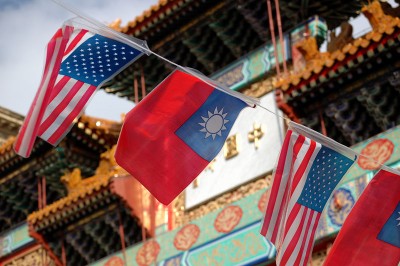China to Ban Doing Business with Firms Selling Weapons to Taiwan

China considers Taiwan its sovereign territory, treating it as a breakaway province to be eventually reunited with the mainland.
Its ruling authorities call incursions by US warships in the Taiwan Strait provocative – the 110 mile-wide waterway separating Taiwan from the mainland.
They consider US arms sales to Taiwan a hostile act.
China’s Defense Minister Wei Fenghe earlier was unequivocal, saying the nation’s military will “firmly defend (China’s) national sovereignty, security and developmental interest.”
Beijing expressed outrage over the Trump regime’s approval to sell about $2.2 billion worth weapons to Taiwan, including Abrams tanks, Hercules armored vehicles, heavy equipment transporters, and Stinger anti-aircraft missiles.
US/Taiwan Business Council head Rupert Hammond said the weapons and equipment “will provide the Taiwan army with a modern capability to deter” an alleged Chinese threat to Taiwan — ignoring the very real one Washington poses to Beijing politically, economically, financially and militarily.
The announced weapons sale came when Taiwanese President Tsai Ing-wen arrived in New York ahead of visiting four Caribbean nations, further angering Beijing.
She met with Taiwanese expats and spoke at Columbia University, an affront to China, especially by calling Beijing an existential threat and falsely claiming Taiwan to be “a vital bastion of democracy in the Indo-Pacific…”
Nations the US values as allies are democracies in name only, allied with its agenda against states it considers adversaries like China.
In the early 1980s under then-Chinese leader Deng Xiaoping, “(o)ne country, two systems” became official Beijing policy, part of its plan for eventual reunification of Taiwan with the mainland, the island state to be treated like Hong Kong and Macau, retaining their own administrative systems.
The one China policy was first mentioned in the Shanghai Communique on February 28, 1972 during Nixon’s visit to China – stressing the importance for both countries to normalize relations.
On January 1, 1979, the Joint Communique on the Establishment of Diplomatic Relations agreed to by Jimmy Carter and Deng Xiaoping formally established bilateral relations, ending official recognition of Taiwan, announced by Carter in December 1978.
The (1992 Consensus) one China principle affirms US recognition of one China comprised of the mainland and Taiwan.
Trump earlier saying “(e)verything is under negotiation including one China” didn’t go down well in Beijing. Its Foreign Ministry spokesman Lu Kang responded, saying this issue is “nonnegotiable.”
One China alone exists, Taiwan an inalienable part of it, he stressed, adding: The People’s Republic of China is its only legitimate government, “an internationally recognized fact, and no one can change it.”
“We urge the relevant party in the United States to realize the high sensitivity of the Taiwan issue and abide by commitments made by previous US governments to the one China policy and the principles of the three joint communiques.”
In response to the $2.2 billion arms sale to Taiwan, China’s Foreign Ministry spokesman Geng Shuang said US companies involved in the sale will be banned from doing business in the country.
Last week, Beijing demanded the Trump regime cancel the sale, saying it interferes in China’s internal affairs, violating the “One China” principle.
US companies involved in the weapons sale include Raytheon, General Dynamics, its Gulfstream Aerospace subsidiary and Honeywell.
China’s Foreign Minister Wang Yi accused the Trump regime of “playing with fire,” urging its officials to fully recognize the gravity of the Taiwan question.
Sino/US relations are already greatly strained over irreconcilable relations on trade, its economic and technology aims, related issues, and militarization of the South China Sea.
Trump regime hardliners seem bent on driving a hard to repair wedge between both countries, making resolution of major differences all the harder.
The Taiwan weapons sale is the latest example.
*
Note to readers: please click the share buttons below. Forward this article to your email lists. Crosspost on your blog site, internet forums. etc.
Award-winning author Stephen Lendman lives in Chicago. He can be reached at [email protected]. He is a Research Associate of the Centre for Research on Globalization (CRG)
His new book as editor and contributor is titled “Flashpoint in Ukraine: US Drive for Hegemony Risks WW III.”
http://www.claritypress.com/LendmanIII.html
Visit his blog site at sjlendman.blogspot.com.

